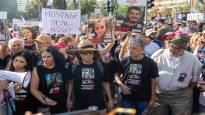In the agreement, Hamas has promised to release about 50 hostages. Israel accepts at least a four-day ceasefire in Gaza.
The Israeli government has voted to approve a prisoner exchange and cease-fire agreement with Hamas.
In the agreement, Hamas has promised to release approximately 50 women and children, who were kidnapped by the terrorist organization in the attack on Israel that began on October 7.
In return, Israel accepts at least a four-day ceasefire in Gaza. Israel says that the cease-fire will be extended by one additional day after this for the ten newly released hostages.
In addition, Israel will release approximately 150 Palestinian women and teenage prisoners in Israeli prisons.
Israel allows humanitarian aid and fuel to Gaza during the ceasefire.
The Israeli government reneged on the prisoner exchange and cease-fire agreement through the night. Prime minister Benjamin Netanyahu tried to convince his government ministers that the ceasefire is only tactical and that the attack on Gaza will continue immediately after the ceasefire.
Reporter of the American NBC News Allan Smith published some parts of the content of the contract in the X service.
The agreement between Israel and Hamas cannot enter into force before Thursday. This is because Israeli citizens can petition the country’s Supreme Court for 24 hours to block the release of Palestinian prisoners.
The release of the hostages in Gaza is supposed to happen in stages so that about 12 hostages are released per day.
The Israeli channel Channel 12 previously reported on the plan drawn up by Prime Minister Netanyahu’s office on how the process of releasing prisoners from Gaza will proceed when the agreement enters into force.
First, Hamas hands over the hostages to the Red Cross, after which they are transferred to the custody of representatives of the Israeli Defense Forces (IDF).
The hostages will then undergo a preliminary medical examination, after which they will be transferred to a hospital in Israel, where they will be able to meet their families.
At this stage, the health authorities and the security authorities decide together whether some of the hostages can be interviewed afresh. Other freed people will be heard later.
The news is updated.
